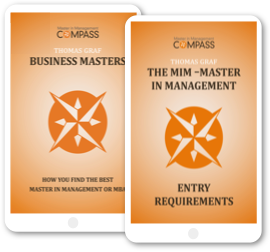Forum: General Forum (6 Comments)
2 qst about MSc management
Posted by - warwick - on 22 September 2012 - 12:22pm
Hi,
First off, this website is the most useful online tool I have found so far, thank you for making it available!
I am a final year BSc Management student in the UK, and I am considering a MSc management. I have 2 questions:
Coming from a management degree, is there a risk that pursuing a master in management I would face the same topics and concepts that I have already studied during my undergrad degree, and therefore that it would be a mere repetition of my current degree?
If this is not the case, how would you explain the fact that students with no business or economics background are still allowed in this course if modules are based on some prior business knowledge?I am mostly interested in marketing, however I'm not able to tell, without prior marketing experience on the firm level, if I want to pursue a marketing career all my life. Moreover, I am scared that MSc in marketing are considered second-level qualifications compared to MSc in management. However, I do know that, ultimately, I want to take up a leading role in an organization in top management. Would a MSc in Management enable me to seek for job opportunities in marketing, and gradually moving up the corporate ladder as I make more experience?
Thank you very much for sharing your opinion of these, i trust it will be most useful.
BEST
Posted by - Thomas Graf - on 5 October 2012 - 11:49pm
Hi there,
many MBA programs require 2 years of work experience (minmimum).
My personal experience and opinion, however, is that people should have 3 years at minimum. Why? Because then they really have some serious experience - at least it is more likely. Of course you also have experience after 2 years and also depends on your internships etc. But my experience is: after three years you have implemented your own projects and you see some of the midterm or longterm results.
You may have your first positive experiences and you may have your negative experiences from which you can learn. You are not a beginner anymore, you are a professional.
By all of this you will enrich your classmates and participate in class discussions. And that's what an MBA is about.
Now, MBA programs that do not require professnal experience at all make me supicious. I am pretty sure that this is the exception. And even the UCLA is not fully open for recent graduates. have a look at www.anderson.ucla.edu... Here they write: "We admit very few people without at least a year or two of post-bachelor degree work." So, you need to convince them why they should take you in the absence of work experience...
If you read the full passage there you see that they are really interested in people who have experience. They are just not as strict as I may be and they takeinto account that experience may come from different sources and that at the end of a day the mixture and diversity is important for a successful MBA class.
Best wishes
ThomasPosted by - warwick - on 6 October 2012 - 5:19pm
Thanks again Thomas for shedding some light on this topic.
Posted by - warwick - on 4 October 2012 - 1:09pm
Hi Thomas
Thank you very much for your reply! It really clarifies things.
If it's ok, I'd like to ask you another question:
MBA programmes differ from MiMs in that they target professionals with at least three to five years of work experience. However it seems that some MBAs admit applicants coming straight from college (for example UCLA ). Did I just misread the admission requirements in this particular case?
Thanks in advance!
Posted by - warwick - on 24 September 2012 - 9:00pm
Hi Thomas
Thank you very much for your reply! It really clarifies things.
If it's ok, I'd like to ask you another question:
MBA programmes differ from MiMs in that they target professionals with at least three to five years of work experience. However it seems that some MBAs admit applicants coming straight from college (for example UCLA ). Did I just misread the admission requirements in this particular case?
Thanks in advance!
Posted by - Thomas Graf - on 22 September 2012 - 5:44pm
Hi there,
thank you for your questions.
To your first question: Redundancy in the curriculum
This is a very good question and the answer is "Yes, there is a risk". The solution, however, is choosing a Master in Management (MIM) program that DOES require a first degree in business or economics. From all MIM programs worldwide, about one third requires such a related first degree (Source: Global Master in Management (MIM) Study 2012).Precisely, because this requirement is important to avoid redundancy, we have created a separate field in our Search Filter called "Entry Requirements". There you can search only for programs that DO require a first degree in business or economics.
To your second question: MSc in Marketing or Master in Management
I would not see a MSc in Marketing as inferior to a Master in Management. The value for both programs at the end of the day depend on the school's reputation and network anyway. There are differences in terms of focus, however.- People who want to become marketing experts and directly compete with others for marketing positions can acquire relevant knowledge in such a course - and ideally also a network of firms.
- You, however, appear to be more broadly oriented. In that case, I would recommend you a Master in Management (MIM) that offers specializations in marketing (in the advanced stages of the program).
Best wishes
Thomas









